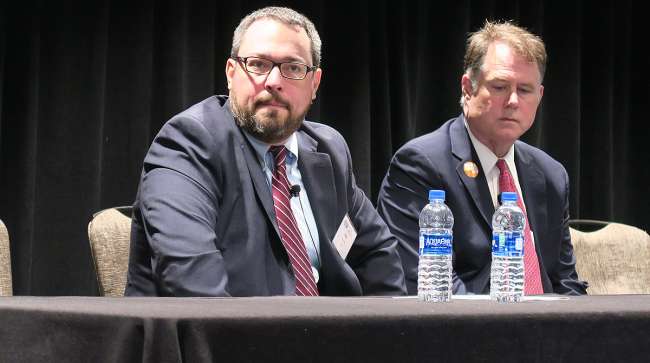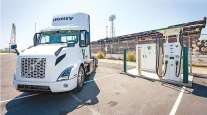Staff Reporter
Industry Leaders Express Cautious Optimism Over Senate EPW Bill

[Stay on top of transportation news: Get TTNews in your inbox.]
WASHINGTON — The Senate Environment and Public Works Committee’s forthcoming highway policy bill will serve as an important first step on the legislative journey to reauthorize the Fixing America’s Surface Transportation Act, industry experts said.
Ed Mortimer, vice president of Transportation Infrastructure at the U.S. Chamber of Commerce, said the bill has the potential to galvanize collaboration in the Senate and the House of Representatives.
He addressed the Transportation Investment Advocacy Center’s Workshop for State and Local Transportation Advocates here July 17.

Mortimer
“That gives us something to say, ‘Hey, House, what are you doing?’ It starts the legislative process,” Mortimer said. “We believe this EPW bill, while not perfect, is a good start.”
The FAST Act is a five-year highway law that expires at the end of September 2020; and at a hearing July 10, committee Chairman John Barrasso (R-Wyo.) said the goal is to produce a bill before the August recess.
Dean Franks, senior vice president of Congressional Relations at the American Road and Transportation Builders Association, acknowledged that the Senate EPW’s bill will form an adequate baseline for further legislation to build on. He said the bill will only grow as House members and Senators confer, and indicated that President Donald Trump will probably weigh in eventually.
“At some point, the president’s going to get in on this,” Franks said. “He’s got to get engaged.”
Mortimer said federal action is necessary to show the United States is serious about modernizing infrastructure. He linked a sound transportation system to the country’s status as an economic powerhouse. The federal fuel tax has been 24.4 cents a gallon for diesel and 18.4 cents a gallon for gasoline since 1993.
“There’s no way we’re going to modernize our infrastructure if we’re using the 1993 mechanism,” Mortimer said. “If we’re going to compete in the 21st century, we need to have 21st-century infrastructure. We need to modernize so we can have every American enjoy a good quality of life.”
In order to fund infrastructure, the Chamber of Commerce supports a 25 cents-per-gallon fuel tax increase over five years. Mortimer said the group does not “come lightly” to supporting a federal tax, but added vehicles that run on gas and diesel remain prevalent.
“Don’t tell us the gas tax is a dying thing,” he said.
Mortimer also said United States does not have a workforce large enough to manage a $2 trillion infrastructure plan such as the one Trump touted. (Negotiations about the plan between Trump and congressional leaders fizzled.) Mortimer called for increased apprenticeships and training programs, as well as immigration policy reform, to prepare a workforce necessary for a massive infrastructure deal.
“We have to have a serious conversation about immigration policy that protects our country and allows us to bring men and women into this country to do these 21st-century jobs,” Mortimer said.




